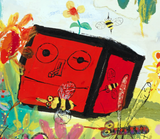Books 2024, #01: The Fire and the Darkness: The Bombing of Dresden, 1945, by Sinclair McKay

Man. Probably shouldn’t have started 2024 by reading this cheerful tome.
What we’ve got here is basically a tier above “airport pop history” book (I do not mean that as an insult; pop history books are fine, and this book’s scholarship and rigor is a level above the best of that genre) deep dive into a pretty contentious topic: the fire-bombing of Dresden by the Allied Air Forces near the end of World War II in Europe.
The books goes deep into the background of the war and how it led to the bombing of Dresden becoming a decision to be made in the first place, and rightly puts some emphasis on the western Allies being somewhat appalled and aggrieved that German resistance, which had seemed to be crumbling in the late summer/early fall of ’44, deeply stiffened over the following winter. The Ardennes Offensive and the V1/2 campaigns in particular were signs that the Germans were going to take quite a bit more effort yet to be convinced that they had lost.
We also get a history of Dresden, its culture, its peoples both before, and after the bombing that I enjoyed quite much, as it shows us what was lost not just in the bombing, but also due to Nazism itself (ie, the changes in Dresden were not entirely the fault solely of Allied Bombing or Soviet occupation). Frankly, the impression the book leaves at the end is that Dresden would be a wonderful city to visit, partially because of its inhabitants attitudes towards the bombing and its aftermath.
There is also a good deal of coverage of the impact of the strategic bombing campaign, an extremely novel form of warfare at the time, on the aircrews that performed it.
The bulk of the book, of course, covers the actual raid(s; Dresden was hit in 3 waves, and it is the later waves for a lot of people that elevate this to an atrocity) themselves and the immediate aftermath for the folks on the ground.
It’s grim reading.
I think the book gives a decent, unbiased presentation of the post-war controversy over the bombing, which has a range of opinions from “This was so egregious a warcrime, it was literally worse than anything the Nazis themselves did” to “fuck them Kraut cocksuckers, nothing bad enough could be done to them”. It also doesn’t really reveal where the author’s opinion lies, a wise choice, I think.
I came away from the reading primarily with a sense of “what a fucking loss” which, to be fair, is how I feel after reading almost any history book written about events during war. Did each of the many, many tens of thousands of dead deserve to die because they were citizens of a brutal, exterminationist regime that started the war they were now losing so badly? What about the few Jews who had managed to survive in the city to that point, did they deserve to be murdered by the Allies? Did the tens of thousands of young men who died in airplanes dropping bombs deserve it? Was turning hundreds of years of rich history to ash necessary to the cause of defeating Nazi Germany?
Who the fuck knows, man. The book rightly doesn’t try to answer that question, it just presents the facts very well, in a readable fashion, and explains the postwar controversy positions well. And I’m very glad the sadly beautiful ending chapter about how Dresden commemorates the bombing every year was included, because it gave a slight bit of cheer to a book that would’ve otherwise put me in a funk for a week.
